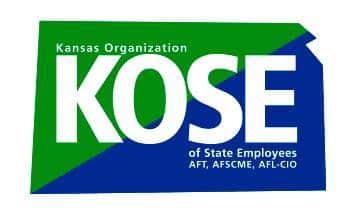
America’s Mental Health Depends on Public Employees, The KOSE Way
by Kansas Organization of State Employees 08/05/2020At the Kansas Organization for State Employees (KOSE), we work to ensure that state employees have the tools and working conditions they need to accomplish the public goals. If our families and communities are to thrive, they need an effective system of mental health services. Funding and staffing cutbacks in the state’s system in recent years have jeopardized our members’ ability to care for people affected by mental illnesses. Currently, Kansas state employees are being strained across the state, and staff shortages in critical sectors are leading to mandatory overtime, putting patients, employees and the public at risk. Larned State Hospital and Osawatomie State Hospital employees are constantly being asked to work 16 hour shifts and are constantly tired and burned out from working so many hours. Legislators must address this understaffing to guarantee the safety of all Kansans.
The state’s two psychiatric hospitals, Larned State Hospital and Osawatomie State Hospital, are unfortunate examples of understaffing, highlighting the challenges state employees face and the threats posed to patients. The Osawatomie State Hospital, created in 1866, began with the goal of providing a more compassionate alternative to imprisoning people with mental illnesses.
Over time, however, this noble goal came undone. In 1990, the Mental Health Reform Act changed the landscape of mental health treatment in Kansas. It funded community mental health centers (CMHCs) and expected those centers to take over the treatment of patients who were residing at or would have been coming to state-run psychiatric hospitals. The hope was to reduce costs and provide better treatment.
But exactly as happened nationwide, problems emerged after lawmakers declined to fully fund the centers, which resulted in state-run psychiatric hospitals overburdened with too many patients and not enough beds. Consequently, today nearly half of Kansas adults with serious mental illness are not in treatment.
With the start of the Great Recession in 2007, funding for community mental health centers was cut further and state employees were faced with the responsibility of even more patients. Gov. Sam Brownback’s 2012 tax cuts greatly exacerbated the problem by slashing resources for mental health services. Three years later, Osawatomie State Hospital was decertified by federal officials due to safety concerns, resulting in nearly $1 million in lost federal funding per month. These factors put more pressure on hospitals to prematurely release patients.
While state hospitals were trying to save costs by releasing patients early, other understaffed programs in Kansas were affected by their decisions.
For years, local hospitals and the criminal justice system have been working with Kansans needing mental health treatment. In 2013, it was estimated that 38 percent of incarcerated adults in Kansas had a mental illness.
In 2017, the Legislature voted to increase funding for Osawatomie State Hospital by $4.7 million, while months earlier Gov. Brownback had suggested cutting nearly $20 million more from the state’s psychiatric hospitals. Despite the additional funding, which is a good first step to alleviate bed shortages, understaffing remains a problem throughout Kansas, resulting in an increase in mandatory overtime. Staff members at the state hospitals have worked, at times, more than 40 hours of overtime per week. The overreliance on overtime places state employees at risk of misjudgments and errors due to fatigue, which endangers patients.
Legislators must address understaffing and act to adequately fund state services. While the reversal of Brownback’s tax plan this summer paid the bills we owed and stopped the bleeding in Kansas, it is still up to members of the Legislature to repair the damage done by years of disinvestments. There is only one way they can do this: by guaranteeing that state programs are properly funded to serve and protect the citizens of our state.
 The Kansas Organization of State Employees (KOSE) a union for executive branch state employees, is the largest union of state employees in Kansas. All non-supervisory, non-confidential employees in the executive branch of Kansas government, except higher education, are eligible to join KOSE, which is affiliated with both the American Federation of Teachers and AFSCME. Our mission is to make real improvements on issues identified by our members, such as compensation, pay equity, healthcare and retirement security, workplace safety, career development, and having a voice on the job.
The Kansas Organization of State Employees (KOSE) a union for executive branch state employees, is the largest union of state employees in Kansas. All non-supervisory, non-confidential employees in the executive branch of Kansas government, except higher education, are eligible to join KOSE, which is affiliated with both the American Federation of Teachers and AFSCME. Our mission is to make real improvements on issues identified by our members, such as compensation, pay equity, healthcare and retirement security, workplace safety, career development, and having a voice on the job.


